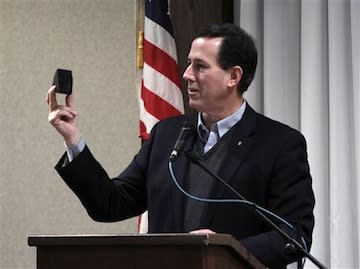 The Ticket
The TicketRick Santorum’s little gaffes: endearing or problematic?

DETROIT -- Rick Santorum is a man who shoots from the hip, and he's proud of it.
"I never have to worry about what I say," Santorum told supporters during a campaign stop in Traverse City, Mich., last weekend, "because I will say what's on my heart. I might not say it the most articulate sometimes and I understand that, but I have no teleprompters. I answer questions."
He's right about a few things here. His speeches are off-the-cuff, a skill he practiced over nearly two decades in public life and honed when he held literally hundreds of intimate town hall meetings in Iowa. Those "events"--a generous term--provided voters with unparalleled access to the former Pennsylvania senator and often felt more like hangout sessions than an address from a presidential candidate. Now that he's leading national polls, Santorum hasn't changed his strategy much, but more people are paying attention to what he says.
And sometimes, he says things that just aren't true--and he ends up having to walk them back when the press hounds him for it.
Most of the baby gaffes are probably by accident, but they could have been avoided if he had better prepared his remarks or--dare we say--used a teleprompter. In the past week alone, Santorum delivered a flowing stream of these small misstatements. Members of the press, constantly on the hunt for something fresh to say, jumped on each one.
During his most recent campaign swing, Santorum's avoidable trouble began while blaming President Barack Obama for high gas prices.
"We went into a recession in 2008 because of gasoline prices," Santorum said on Feb. 27 during a speech in Lansing, Mich. "The bubble burst in housing because people couldn't pay their mortgages because of $4-a-gallon gasoline."
Well sure, high prices at the pump certainly don't help while financial resources are tight, and economists have debated the role they played in the recession. But Santorum used the word "because," suggesting that it was gas prices that single-handedly brought down the global economy. After the speech, reporters tried to get him to clarify the remarks to see if that's what he meant, but he declined to walk it back at first.
The next afternoon, on primary day, reporters were still asking him about it, which is not what he wanted to discuss just hours before the polls closed.
"Certainly the spiking gas prices had a huge impact on the recession in 2008," Santorum said, defending his comments.
"But did they cause it?" a reporter pressed.
"Okayyy," he said. "They contributed to, if that's a better way of putting it, they contributed to the recession of 2008."
Later that night, as Santorum addressed his supporters in Grand Rapids after it was clear that Romney would win both state contests in Arizona and Michigan, Santorum stuck with his trademark free-flowing style. He discussed how far the campaign had come, vowed to press on and invoked the nation's founders, saying: "The men and women who signed that declaration wrote the final phrase, 'We pledge to each other our lives, our fortune and our sacred honor."
Reporters sitting in the back noticed, and brought up the error during a question and answer session with Santorum's chief strategist John Brabender later that night.
"He said men and women signed the declaration," a reporter said. "No women signed it."
"I'm sorry," Brabender said. "You're right, if you want a retraction on that, I won't tell you otherwise."
During the same speech, Santorum also promised that his administration would "end entitlement programs on the federal level, give them back to the states and cut them dramatically to save money." For many people--right or wrong--the vague promise to "end entitlement programs" could mean dismantling the federal Social Security and Medicare programs--which is not something Santorum wants people to think he believes. (Brabender, again asked to clarify, said that Santorum was referring to programs like food stamps, and that while Social Security needs reforming, it should belong in the federal government's domain.)
These small misstatements, of course, aren't devastating. They won't torpedo his candidacy. Campaigning will go on. But is appearing off-the-cuff so important that it's worth having to constantly correct and clarify, when you could be talking up your strengths and ideas or highlighting the weaknesses of Obama or Mitt Romney?
For Santorum, the answer is a firm yes.
"What you have with me," he likes to say, "is 'what you see is what you get.' " And perhaps some voters find this freestyle nature endearing and real, gaffes and all.
Then again, maybe reporters just have too much time on their hands.
More popular Yahoo! News stories:
• Battered and bruised, Mitt Romney is limping toward the GOP nomination
• Romney wins pivotal Michigan primary as well as Arizona
• Fighting drugs and border violence in America's most dangerous national park: What about the ranger's M14 rifle, Yogi?
Want more of our best political stories? Visit The Ticket or connect with us on Facebook, follow us on Twitter, or add us on Tumblr. Handy with a camera? Join our Election 2012 Flickr group to submit your photos of the campaign in action.

